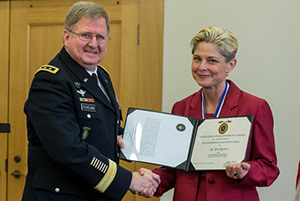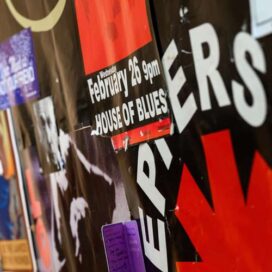U.S. Special Operations Command awards Outstanding Civilian Service Medal to ND business professor
Published: June 2, 2015 / Author: Carol Elliott

Viva Bartkus, associate professor of management at the University of Notre Dame’s Mendoza College of Business, was awarded the United States Special Operations Command Outstanding Civilian Service Medal during a May 13 ceremony held on the Notre Dame campus.
Lt. Gen. Charles T. Cleveland, the commanding general of the United States Army Special Operations Command (USASOC), presented the award to Bartkus in recognition of her contributions of “energy, experience and intellect” in working with the command on the development of new approaches for stabilizing conflict-torn countries through business.
Cleveland bestowed the award on behalf of the United States Special Operations Command (USSOCOM), which oversees the special operations commands of the Army, Air Force, Navy and Marine Corps of the United States Armed Forces. The award was signed by Gen. Joseph Votel, USSOCOM commander.
Established by the USSOCOM commander in 1998, the Outstanding Civilian Service Medal is the highest honor that USSOCOM can bestow. The award recognizes civilians who have provided outstanding support or service.
In his remarks, Cleveland mentioned the integral role played by his brother George Cleveland (ND MBA ’09), a former student of Bartkus’ who helped connect her work to the USASOC.

“[George] and I share in a hope that the unlikely path that brought him to the Mendoza College and led me to the U.S. Army Special Operations Command is part of a grand plan that allowed the creation of an unlikely partnership,” said Cleveland. “One that if nurtured, supported and let grow could perhaps bring peace through justice, stability and security to many in a troubled world.”
Bartkus began working with USASOC in 2014 in conjunction with an innovative Notre Dame MBA course and initiative Business on the Frontlines that she helped to found and launch in 2008. The course focuses on harnessing the power, dynamism and creativity of business in rebuilding post-conflict countries as a way of fostering long-term stability and peace.
A key component of the course is a field project that sends student teams to these areas to study the problems firsthand.
Since its launch, Business on the Frontlines has sent hundreds of Notre Dame MBA, law and peace studies students to nearly 20 countries and regions to both learn and to provide agency partners with research and recommendations. Issues studied have ranged widely from agricultural projects and health-care access, to micro-finance initiatives and entrepreneurial ventures. In 2010, Forbes magazine selected Frontlines for its list of the “Ten Most Innovative MBA Courses.”
Business on the Frontlines has partnered with USASOC on projects in West Africa and Latin America, in areas where violence from extremists, insurgents and the illegal drug trade have had a severe impact on communities. Bartkus also has served as a mentor and advisor to USASOC officers and non-commissioned officers in this emerging approach to addressing social issues through a collaboration of business, academic, military, government and community partners.
More than 30 former Frontlines students and 10 USASOC soldiers traveled to Mendoza to be present during the award ceremony along with members of Bartkus’ family, friends and colleagues.

“Notre Dame is probably the only place in academia that could have launched and fostered such an initiative, not just because we have a leading peace studies institute and a leading law school and the capabilities from the colleges of science and engineering, all anchored by the world-class Mendoza College of Business,” said Bartkus in accepting the award. “No, Business on the Frontlines could have only started at Notre Dame because of our Catholic faith. It is our faith that teaches us the inherent human dignity of all that we serve.
“And I, for one, never underestimate the human dignity involved with a good day’s work, primarily for those who have suffered through conflict.”
She described the course as offering a unique opportunity for students to learn that service is a privilege, and to collaborate across disciplines and colleges “because, frankly, real-world problems rarely respect such boundaries.”
Bartkus further noted that working with the Special Operations soldiers strengthened the effort as well. “You made us better. Not until we started working alongside your soldiers in the field did we really understand the power of combining business and security in the search for peace,” she added.
Bartkus graduated summa cum laude from Yale University with master’s and bachelor’s degrees in economics, and earned her doctorate and master’s degrees in international relations at Oxford University while on a Rhodes Scholarship. Her current research and teaching interests concentrate on three areas: the business and economics of conflict, the leadership approaches most effective in solving complex business problems and the social capital of communities that enables collaboration.
###
Related Stories




